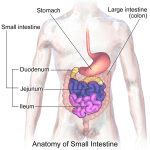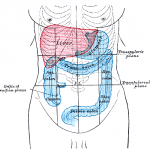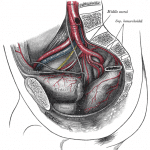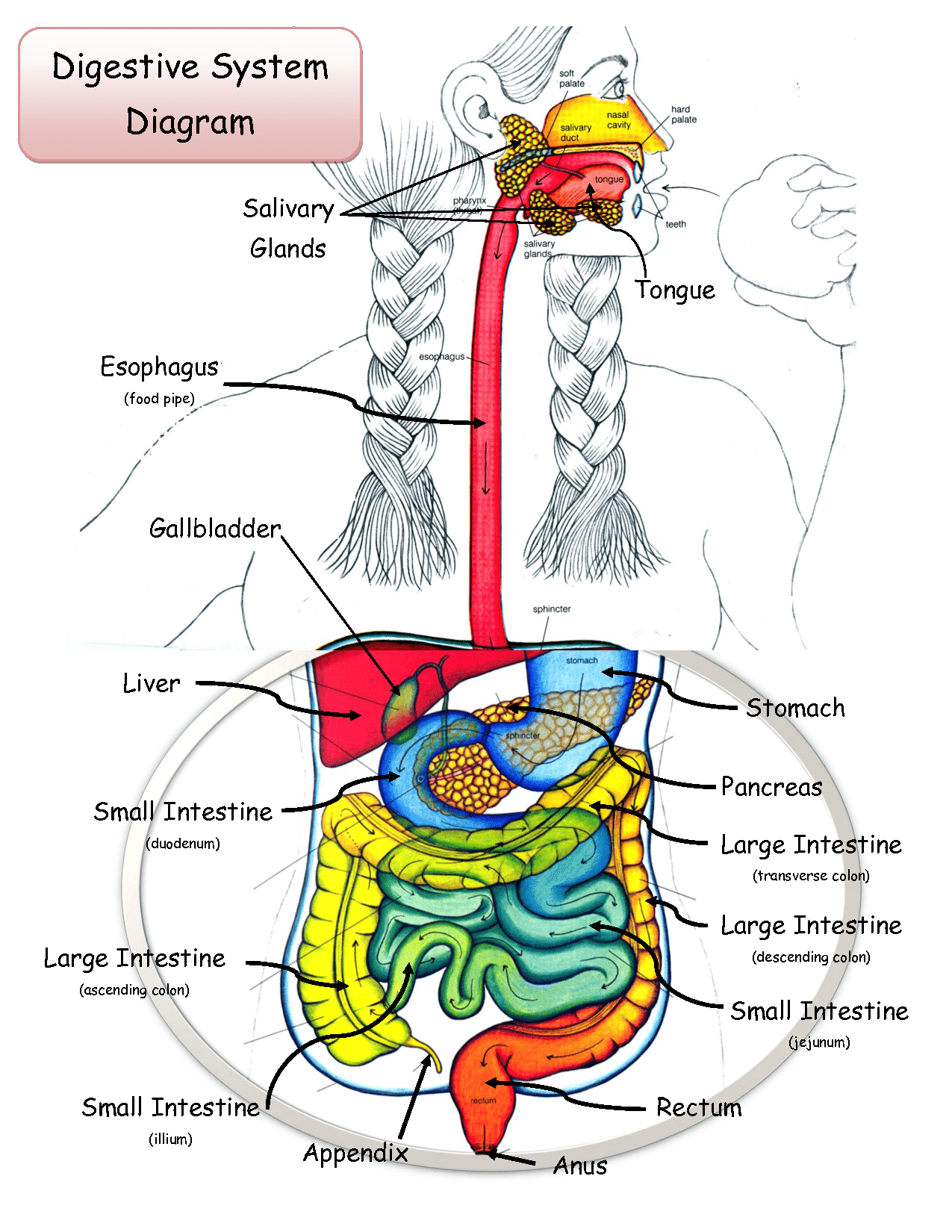The gastrointestinal tract, or digestive system is the organ system responsible for consuming and digesting food while absorbing the nutrients, then expelling waste. This consists of all organs between the mouth and anus. It is also essential for immune functioning, and homeostasis in the body.
The organs that comprise the tract are the following organs following the oral cavity, which secretes saliva from 3 distinct glands in the mouth, which consist of large amounts of smaller glands, leading down:
- the esophogus – the foodpipe leading to the stomach, consisting of a fibromuscular tube aided by peristaltic contractions
- stomach – a muscular and hollow dilated organ that secretes protein digesting enzymes and strong acids to breakdown food in digestion by contorting smoothly to send the partially digested chyme to the small intestine.
- duodenum – the first section of the small intestine, where the majority of chemical digestion takes place. Specific glands called
 Brunner’s glands secrete a mucus rich alkaline containing bicarbonate to neutralize stomach acid, lubricate intestinal walls, and give the alkaline enzymes ability to absorb the acidic chyme. It breaks down food with leafy shaped villi and the malaria mucosae loaded with enzymes lining the intestinal walls. The duodenum regulates the stomach via hormonal pathways, when the stomach releases chyme (partially digested ball of food) through the pylorus (stomach opening) which is when Secretin and Cholecystokinin release causing the liver and gall bladder to release bile, and the pancreas to produce bicarbonate and other digestive enzymes: tripsin, amalase, and lipase, sucrase, maltase, and secretin
Brunner’s glands secrete a mucus rich alkaline containing bicarbonate to neutralize stomach acid, lubricate intestinal walls, and give the alkaline enzymes ability to absorb the acidic chyme. It breaks down food with leafy shaped villi and the malaria mucosae loaded with enzymes lining the intestinal walls. The duodenum regulates the stomach via hormonal pathways, when the stomach releases chyme (partially digested ball of food) through the pylorus (stomach opening) which is when Secretin and Cholecystokinin release causing the liver and gall bladder to release bile, and the pancreas to produce bicarbonate and other digestive enzymes: tripsin, amalase, and lipase, sucrase, maltase, and secretin - the jejunum – the second part of the small intestine that is exposed to food, and lined with nutrient absorbing mucosa called villi. The villi in the Jejunum are much longer than those in the Ileum and Duodenum. It is a site of active transport of amino acids, small peptides, vitamins and glucose and passive transport of the sugar fructose. The Jejenum is about 2/5th of the entire small intestine length (~7m in an adult male, highly variant).
- the Ileum – the final section of the small intestine that is indistinguishable from the Jejenum in humans that is abou
 t 2-4 meters long and connects with the cecum, the first portion of the large intestine. It absorbs mostly vitamin B12, bile salts, and other digestive products left by the jejunum. This tract has folds of villi and microvilli to allow for maximum surface area for absorption of enzymes and digestive products. The diffuse neuroendocrine cells secrete their various hormones and the final digestion of proteins and carbohydrates takes place before passing the remaining chyme to the colon(large intestine).
t 2-4 meters long and connects with the cecum, the first portion of the large intestine. It absorbs mostly vitamin B12, bile salts, and other digestive products left by the jejunum. This tract has folds of villi and microvilli to allow for maximum surface area for absorption of enzymes and digestive products. The diffuse neuroendocrine cells secrete their various hormones and the final digestion of proteins and carbohydrates takes place before passing the remaining chyme to the colon(large intestine). - the cecum – a pouch at the beginning of the large intestine, that contain the appendix (a proposed vestigial structure remaining from herbivore ancestors by Darwin), which is mostly vestigial and a dead pouch at the beginning of the large intestine
- the colon – categorized into ascending, transverse, descending, and
 sigmoid the large intestine is responsible for water absorption and the last remains of food before it is emptied into the rectum. The ascending and transverse are responsible for water absorption and the descending parts of the colon prepare waste for removal, storing it until it is removed for a bowel movement. The sigmoid portion of the colon allows for storage and release of gas, without (hopefully!) releasing fecal matter.
sigmoid the large intestine is responsible for water absorption and the last remains of food before it is emptied into the rectum. The ascending and transverse are responsible for water absorption and the descending parts of the colon prepare waste for removal, storing it until it is removed for a bowel movement. The sigmoid portion of the colon allows for storage and release of gas, without (hopefully!) releasing fecal matter.
- the rectum – The rectum is the final part of the small intestine, it acts as a temporary storage point for fecal matter and then releases through the anal canal, but acts as a flexible point of temporary storage.
- the anal canal – the final passing point between the rectum and the environment, it is about 3-4 centimeters long and is classified into 3 parts. The lining becomes more skin like as it descends and it gets a significant amount of blood flow.
This system allows for the absorption of nutrients for the body to use in all of its processes, but breaking down the food requires energy and vigilance for dangerous bacteria and viruses that could be contained in the nutrients as they are assimilated into the body. The entire tract is about 30 feet long and has specialized sections devoted to various tasks and release of hormones and enzymes into the chyme as it moves down the tract and is finally expelled.
Food moves through the body after chewing and swallowing via peristalsis in the esophagus, which moves food into the stomach after about 8 or 9 seconds. Secondary waves can occur to move larger chunks of food down the throat in addition to the primary wave, and stretch and reflexes activate until it is moved into the stomach. Once processed by the stomach, chunky chyme is moved through the pyloric sphincter into the duodenum. Then slower waves occur that mix, rather than move, the chyme with the intestinal enzymes, hormones, and fluids for absorption. Once the chyme reaches the large intestine, it moves with periodic movements of mass which occur a few times per day to expel waste towards the rectum.
The gastrointestinal tract is largely responsible for homeostasis in the body; there are massive amounts of hormones secreted by the organs to break down and assimilate nutrients alongside enzymes. The gut is largely responsible for endocrine and lymphatic efficiencies because the gastrointestinal tract is a source for the nutrients of both systems. These two factors work together with bile from the liver and gallbladder to break down and assimilate the desired nutrient bodies. In the intestines, all forces of the body work together to move food through the system and assimilate it without contracting pathogens.
The gastrointestinal system has enormous effect on the rest of the body, because it is where nutrients are restored to all systems for continued growth, including the nervous system, muscular-skeletal systems, endocrine system, lymph system, and circulatory system. Diet is one of the most important contributors to the body’s overall homeostasis, which can include mental health. Studies are finding more links and correlations between diet and mental health. Many studies have found links between depression and nutrition, including mood correlations. There is more and more research linking happiness to diet; seratonin, the supposed happiness neurohormone is 90% in the gut. Whole, unprocessed foods with dense nutrients and variety coinciding with seasonal availability tends to be optimal for the system.
- What diets have you found to be useful?
- What foods have and haven’t worked?
- What types of organic processes are you interested in learning more about?

